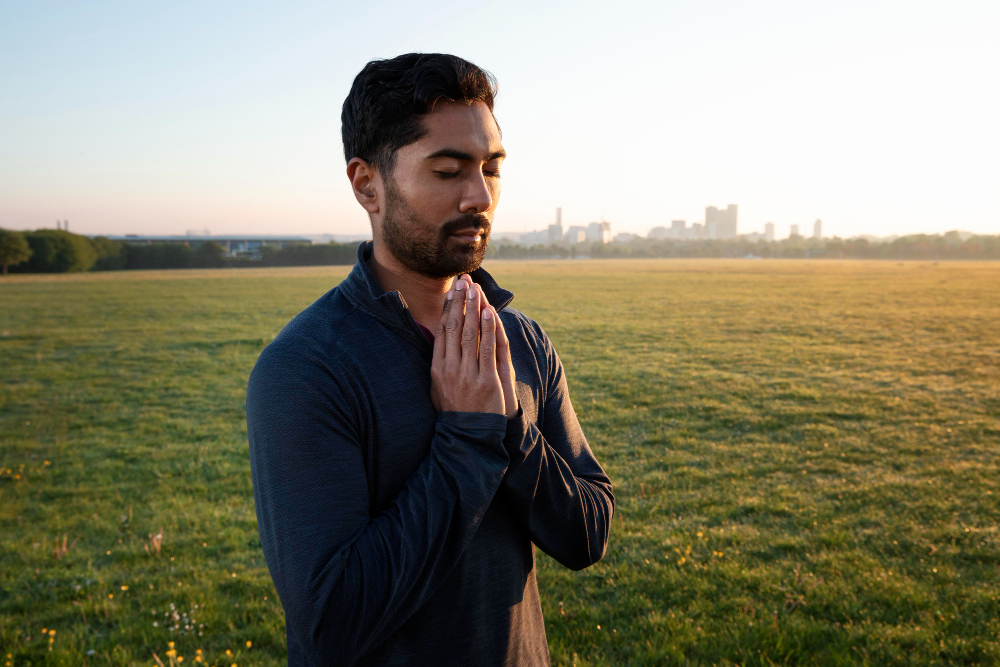Are you seeking to deepen your connection with God through the power of prayer? Are you wondering how to pray according to the Bible and what types of prayer are mentioned in it? In the Bible, prayer is described as a way to communicate with God and seek guidance, forgiveness, and blessings. It is not just a religious obligation but a powerful tool for spiritual growth and connection with our Creator.
If we study the Bible, we can find various types of prayers mentioned that were offered by different people in different situations. Each type of prayer has its own significance and purpose.
When we understand the types of prayer mentioned in the Bible, we can better understand how to approach God and pray according to His will. That’s why, today we’re going to explore the 7 types of prayer in the Bible. Each type is unique and offers a different way to connect with God.
Related: How to Study the Bible for Beginners in 5 Simple Steps
7 Types of Prayer in the Bible
1. Praise and Worship Prayer


The Bible teaches us to praise and worship God through prayer. In this type of prayer, we acknowledge God’s greatness, power, and love. It is an expression of our gratitude for all that He has done for us and continues to do in our lives. We can find examples of this type of prayer in Psalms where David praises God for His mighty deeds. Praise and worship prayer can be done individually or in groups, like during church services.
Here are some tips on how to incorporate praise and worship prayer into your personal prayer life:
Begin with a grateful heart: Before starting your prayer, take a moment to reflect on all the blessings in your life and thank God for them. This will help shift your focus onto God’s goodness and set the tone for your prayer.
Speak personally: Use “I” statements to express your love and gratitude for God. For example, “I am grateful for your unfailing love and faithfulness in my life.” This will help make your prayer more intimate and meaningful.
Use Scriptures: Incorporate verses from the Bible that speak of God’s goodness and greatness in your prayer. To get started, check out Psalms 100 and 150.
2. Intercessory Prayer


Intercession is the act of praying on behalf of others, and this type of prayer is mentioned multiple times in the Bible. This includes praying for the needs of others, including family members, friends, the community, and even our enemies.
When we intercede for others, we are following the example of Jesus who constantly prayed for His disciples and all believers. Intercessory prayer shows our love and compassion for others and is a powerful way to bring about change in their lives.
You can incorporate intercessory prayer into your daily routine by:
Maintaining a prayer list: Create a list of people and their needs, and commit to praying for them regularly. This will help you stay organized and focused during your intercessory prayer time.
Praying with empathy: As you pray for others, try to understand their struggles and needs. This will help you pray more specifically and with greater compassion.
Praying in faith: Believe that God is able to answer your prayers and trust in His timing. Pray with confidence, knowing that He hears and cares for each person you are interceding for.
3. Confession Prayer


Confessing our sins and asking for forgiveness is an important part of a believer’s prayer life. It is essential to acknowledge our wrongdoings, repent, and seek God’s mercy and grace. This type of prayer helps us maintain a clean conscience before God and strengthens our relationship with Him.
Confession prayer can be done individually or in a group, like during church services. Also, it is recommended to regularly examine our hearts and confess any sins that may be hindering our relationship with God.
Be specific: When confessing, be honest and specific about the sins you have committed. This will help you to genuinely seek forgiveness and turn away from those actions in the future.
Repent: Repentance means turning away from our sins and seeking to live a righteous life. As you confess, ask God for the strength and guidance to overcome temptation and live according to His will.
Receive God’s forgiveness: Remember that God is faithful to forgive our sins when we confess them. Accept His forgiveness and move forward with a renewed heart and mind.
4. Petition Prayer


This form of prayer focuses on seeking God’s help for specific needs or heartfelt desires. We can bring all our requests, big or small, to Him in petition prayer. In the Bible, we can find many examples of people offering petition prayers to God and receiving answers.
When praying for our needs, it is important to align them with God’s will and trust in His plan for our lives. Many times, we may think we know what is best for us, but God’s plans are always greater and more perfect than our own.
Petition prayer also allows us to bring our concerns and worries to God, knowing that He cares for us and wants to help us. We can pray for healing, provision, guidance, protection, and anything else that weighs on our hearts. If our prayers are aligned with God’s will, we can have confidence that He will answer them in His perfect timing.
5. Thanksgiving Prayer


Thanksgiving is a form of prayer that involves expressing gratitude to God for all His blessings, both big and small. It is an act of faith that acknowledges God as the source of all good things in our lives. We can find many examples of this type of prayer throughout the Bible, including in the life of Jesus who often gave thanks to God.
Thanksgiving prayer helps us cultivate a heart of gratitude and reminds us to always count our blessings, even in difficult times.
Make it a habit: Set aside time each day to thank God for specific things in your life. This will help you develop an attitude of thankfulness and see God’s goodness more clearly.
Thank Him for the little things: Don’t overlook the small blessings in life, like a beautiful sunset or a warm meal. Thank God for all the good things He provides, big or small.
Read More: How to Grow Spiritually According to the Bible
6. Fellowship Prayer


Fellowship prayer is a type of prayer that is done with other believers. This can be done in small groups, during church services, or even with just one other person. Fellowship prayer allows us to come together as a community and lift up our concerns, praises, and needs to God.
If you are struggling to incorporate prayer into your daily routine, consider joining a prayer group or asking a friend to pray with you. This can help keep you accountable and provide support and encouragement in your prayer life.
Fellowship prayer also allows us to learn from each other. As we share our prayer requests and experiences, we can gain new perspectives and insights. We can also be encouraged by the prayers of others and see how God is working in their lives.
7. Silent Prayer


Silent prayer involves communicating with God without speaking out loud. This form of prayer allows us to connect with God in a deeply personal and introspective way. The Bible mentions instances where Jesus Himself withdrew to solitary places for quiet time with God. Silent prayer encourages us to listen more and talk less, fostering an environment where we can hear God’s still small voice amidst the noise of everyday life.
Find a quiet place: Choose a quiet, distraction-free place for solitude. This will help you focus solely on your conversation with God.
Quiet your mind: Take a few moments to calm your thoughts and center your heart on God’s presence. This can involve deep breathing or meditative techniques to help you relax and become more aware of God’s presence.
Listen and reflect: Spend time listening to God’s voice and reflecting on what He may be speaking to you. This can involve reading scripture, journaling, or simply being still in His presence.
Some Tips When Learning to Pray


Learning to pray can be a deeply rewarding journey that enriches your spiritual life. Here are some tips to help you grow more comfortable and confident in your prayer practice:
Start small: If you’re new to prayer, start with short and simple prayers. Over time, you can gradually increase the length and depth of your prayers as you become more comfortable.
Set a regular time: Establish a specific time each day dedicated to prayer. This routine can help make prayer a regular and non-negotiable part of your daily schedule.
Create a prayer journal: Write down your prayer requests and reflections in a journal. This not only helps you remember what you have prayed for but also allows you to look back and see how God has answered your prayers.
Be persistent: Don’t give up on prayer if you feel like your prayers are not being answered. God works in His own timing and always has our best interest at heart. Stay persistent and continue to trust in His plan for your life.
Conclusion
Prayer is a vital aspect of our relationship with God and should be a regular part of our daily lives. By incorporating different types of prayer into our routine, we can deepen our connection with God and grow in faith.
May we always approach God with reverence and trust, knowing that He hears and answers our prayers according to His perfect will. So let us make prayer a priority in our lives and experience the power of communicating with our Heavenly Father.
FAQs About types of prayer in the Bible
What is prayer?
Prayer is a form of communication with God, where believers express their praise, gratitude, confessions, and requests. It is a way to build a personal relationship with God and seek His guidance and intervention in their lives.
How often should I pray?
While there is no specific rule on how often one should pray, it is generally recommended to make prayer a regular part of your daily routine. Many find comfort and strength in praying multiple times a day, such as in the morning, at meals, and before bed.
What should I do if I’m unsure of what to pray for?
It’s natural to sometimes feel unsure about what to pray for. In such cases, you can start by thanking God for His blessings, asking for His guidance, or praying for the well-being of others. You can also seek inspiration from the Bible or recite traditional prayers.
Can I pray silently?
Yes, silent prayer is a powerful way to connect with God. It involves communicating with God in your heart and mind without speaking out loud. Silent prayer can help create a deeper sense of intimacy and focus.
Does God answer all prayers?
God hears all prayers, but His answers may vary. Sometimes His response might be immediate, other times it may take longer, and occasionally the answer may be different from what we expect. It is important to trust in God’s wisdom and timing, knowing that He always has our best interests at heart.
Can group prayer be more effective than individual prayer?
Group prayer, or fellowship prayer, can be very powerful as it brings believers together to support and encourage each other. While personal prayer is essential for building an individual relationship with God, group prayer allows for shared faith experiences and collective strength in seeking God’s intervention.
Must Read:
Top 8 Reasons Why the Bible is Important
Spiritual Self Care: Techniques, Benefits, and Importance
